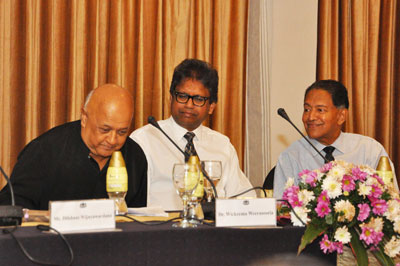SL’s GDP worth $67 bln just a fraction of Shell group’s sales of $451bln in 2013
“If you do not the grasp the ‘first principles’ you will never be a good lawyer and a lawyer without history or literature is a mere mechanic. But a lawyer who acquires some knowledge of history is entitled to be called himself an architect,” said Dr. Wickrama Weerasooria, law teacher and former public servant, who was the chief guest at the launch of the book titled Company Law co- authored by President’s Counsel K. Kanag Isvaran and Dilshani Wijayawardena in Colombo recently.

From left: Dr Wickrama Weerasooria, Dr Harsha Cabral and Mr. K.Kanag Isvaran.
Referring to companies in Sri Lanka, he said there were few companies in existence in the bygone era and the majority of Sri Lankan people were sole traders. But later on the agency houses came along following the setting-up of coffee and tea plantations and partnerships formed later. Several companies became agency houses and formed partnerships. The company Veediya became ‘Kompanna Veediya’ as many locals had difficulty in pronouncing the word ‘company’. The street became well known in those days because of the Ice company which supplied ice to the whole of Sri Lanka. The company was a new concept of doing business as far as business persons were concerned. Most companies in England including the Bank of England were created by the Royal Charter. He said the institution that captured Ceylon in 1796 was the British East India Company that sent troops over here. In 1644 legislation was made in England in respect of companies and in 1938 legislation was made in Sri Lanka based on English legislation. The first company to be set up in Ceylon under that legislation was the Ceylinco Insurance company. Although there wasn’t a definition of a company, it was created by statue. Companies were created to avoid liabilities and debts to sole traders. Even where partnerships were concerned it was dissolved when the partner dies. The company has no death certificate except winding up the company, he said.
Referring to condominiums, he said parliament brought in legislation to protect those who owned apartments at different levels. According to legal definition, whatever built on soil accrues to the soil and only the first apartment built on the ground was protected. He said local blue chip companies cannot be compared to huge multinational conglomerates abroad. “Annual sales of those companies are bigger than the GDP of Sri Lanka. Ours was about US$67 billion in 2013 whereas the Shell company annual sales were around $451 billion. These are mind boggling figures of big conglomerates.” Dr. Weerasooria also complimented both authors for the book. Mr. Kanag Isvaran, Ms Wijayawardana and Dr. Harsha Cabral, another top corporate lawyer and former junior in Mr. Kanag Isvaran’s chambers, also spoke on the occasion. Copies of the book were handed over to the Chief Justice Mohan Peiris, judges of the Supreme Court and the Court of Appeal and to the libraries of the Colombo, Peradeniya and Jaffna universities.


